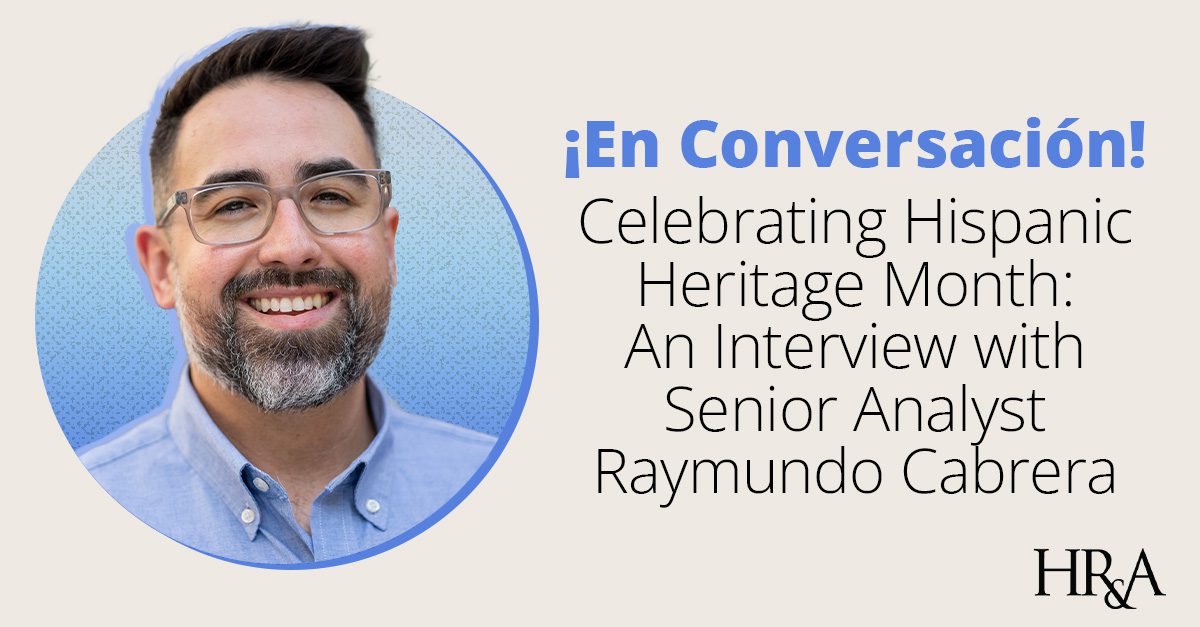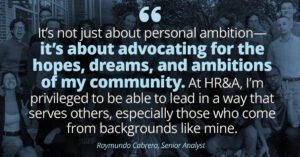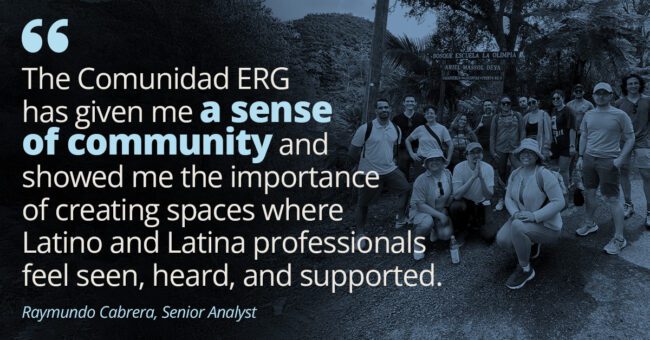on Sep 26, 2024
¡En Conversación! Celebrating Hispanic Heritage Month: An Interview with Senior Analyst Raymundo “Ray” Cabrera

¡En Conversación! Celebrating Hispanic Heritage Month: An Interview with Senior Analyst Raymundo “Ray” Cabrera
As part of our Hispanic Heritage Month celebration, we sat down with Raymundo “Ray” Cabrera, Senior Analyst, to discuss how his background has influenced his leadership style, his aspirations for the Latine/o community, and the projects he’s passionate about. His dedication to improving opportunities for others and his commitment to addressing critical issues like equitable economic development, transit access, and community engagement reflect the spirit of Hispanic Heritage Month.
How has your background influenced your approach to leadership and problem-solving in your work?
Ray: I grew up in a Mexican American family with deep roots in the Southwest. My great-grandparents came to the U.S. as children — both sides of my family worked in either mining or ranching. My grandparents were born in rural communities and eventually moved into the Phoenix area, growing our family. My family’s story has always been characterized by working-class resilience and each generation striving to improve the lives of their children.
Coming from that background, the concept of servant leadership has shaped my career. My parents and grandparents made sacrifices for my generation, and I carry that sense of responsibility with me in everything I do. Whether I’m meeting with a government leader or a nonprofit executive, I see it as my duty to represent the voices of those who may not have the same access to those rooms. It’s not just about personal ambition — it’s about advocating for the hopes, dreams, and ambitions of my community. At HR&A, I’m privileged to be able to lead in a way that serves others, especially those who come from backgrounds like mine.

What are your hopes and aspirations for the Hispanic and Latine/o community in the future and what challenges do you see ahead?
Ray: The Latino community is incredibly diverse. My experience as a Mexican-American kid from the desert Southwest is very different from someone who grew up Hispanic in New York or a more recent immigrant from Central America. Despite these differences, my hope for our community centers on creating opportunities for people like my family — those who have worked tirelessly to provide a better future for their children.
One of the biggest challenges we face is the growing difficulty of achieving the American Dream, especially for those from working-class backgrounds. For instance, my father was a blocklayer who initially thrived during a boom in Phoenix’s housing market. However, when the recession hit in the early 2000s, his opportunities vanished. Despite his hard work and skills, he struggled to access alternative pathways and resources. This experience drives my commitment to expanding access to opportunity for Latino communities.
Homeownership is another central tenant of the American Dream that feels increasingly out of reach for the Latino community, and this is a major barrier to building generational wealth. Homeownership was always seen as the way to advance and provide a better future for your family, but for many people, that’s not possible anymore. My peers, my cousins, and my friends all struggle with this. And a lot of that comes down to policy decisions. We’ve made choices as a society to limit housing in places like L.A. and New York, making it too expensive for many.
At HR&A, we’re lucky to be work working on urban challenges like economic development and homeownership that impact everyone, but it’s important to remember that some of these issues hit the Latino community and communities of color particularly hard.
How do your current projects contribute to your aspirations for the Latino community?
Ray: We’ve been working in Pacoima, a neighborhood in the San Fernando Valley of Los Angeles, with a Latino community that has faced many challenges, many of which are a result of redlining and environmental injustices from industrial activities. It’s a historically disinvested neighborhood where Black and Mexican-American communities have lived for generations.
Currently, there’s a major opportunity for transformation with a new light rail extension planned to connect Pacoima to the broader transit network. While this investment could bring much-needed improvements and connectivity, it also raises concerns about potential gentrification and displacement. Communities of color can be negatively impacted by major infrastructure investments, where rising property values and rents lead to the loss of affordable housing for long-standing residents.

To address these concerns, we’re supporting Neighborhood Legal Services of Los Angeles County (NLSLA) and the Pacoima community to develop a comprehensive equity agenda. This agenda is being set by engaging with the community and key stakeholders to identify concerns and priority issues. It aims to help inform a campaign, that will ultimately be led by a coalition of Community-Based Organizations (CBOs) to ensure that the benefits of the new transit project are equitably distributed, and that the investment serves the people who have been part of Pacoima’s fabric for years. We are working with NLSLA and Pacoima CBOs to help them lift up key policy and advocacy points for the CBOs to present to decision-makers to support their work advocating for measures that protect the community from displacement and ensure that the investment enhances the neighborhood without erasing its history and diversity.
This project reflects my desire to help advance equitable development and ensure that significant investments in infrastructure contribute positively to the communities that have long been underserved. It’s about creating a future where progress doesn’t come at the expense of those who have already faced so many challenges.
How do you support emerging Latino and Latina professionals at HR&A?
Ray: One of the most impactful things for me has been the Comunidad Employee Resource Group (ERG) at HR&A. When I first joined the firm, the transition wasn’t seamless, and it took a while for me to find my bearings. The ERG became a source of support and belonging. It’s a space where we can share experiences and learn from each other.

A key moment for me was also working with Andrea, a Latina leader at the firm who’s been a mentor and partner. Seeing her leadership and how she champions others has been inspiring. The Comunidad ERG has given me a sense of community and showed me the importance of creating spaces where Latino and Latina professionals feel seen, heard, and supported. It’s something I hope to continue fostering as I grow in my career.